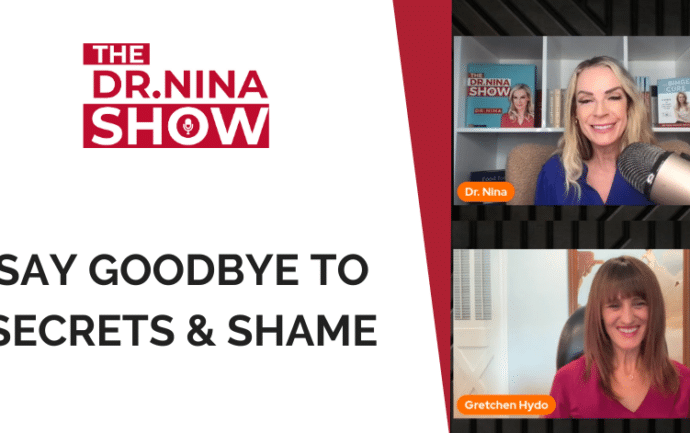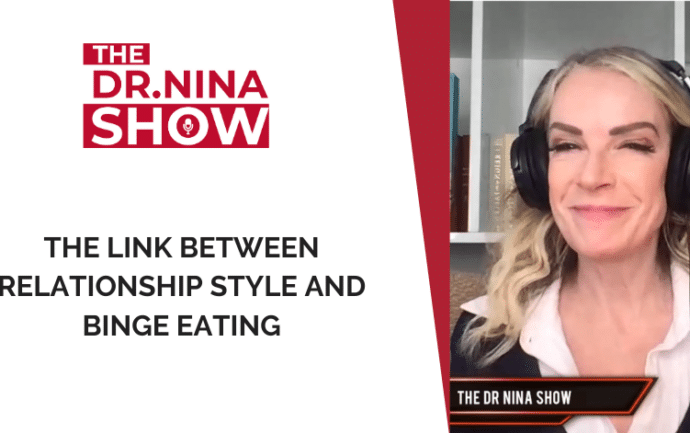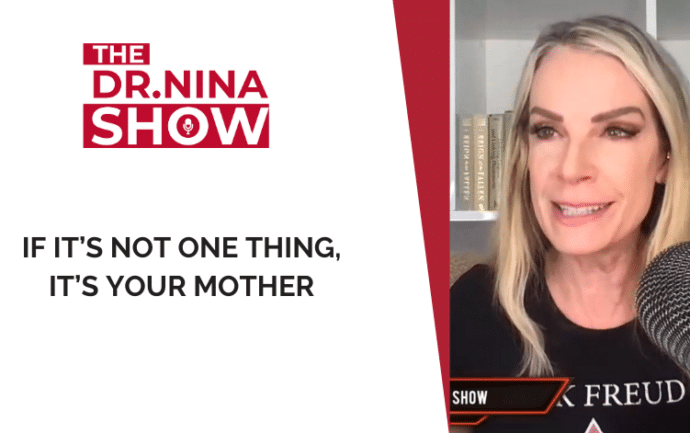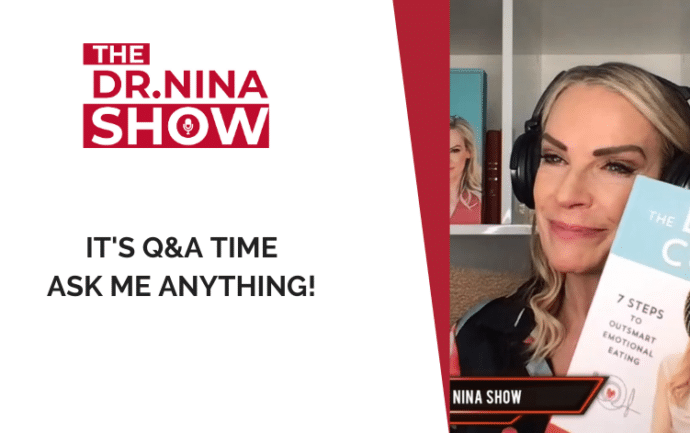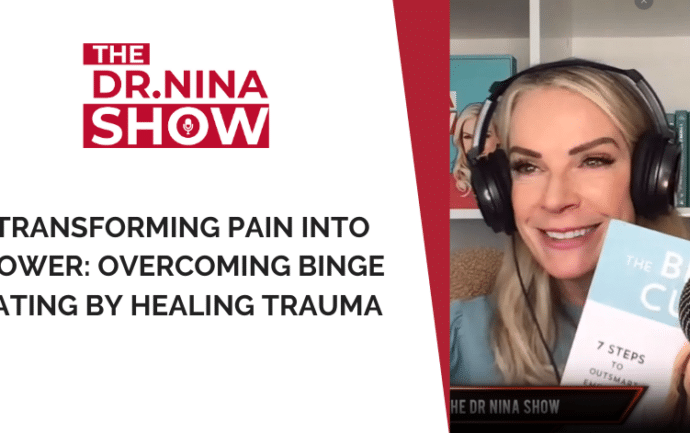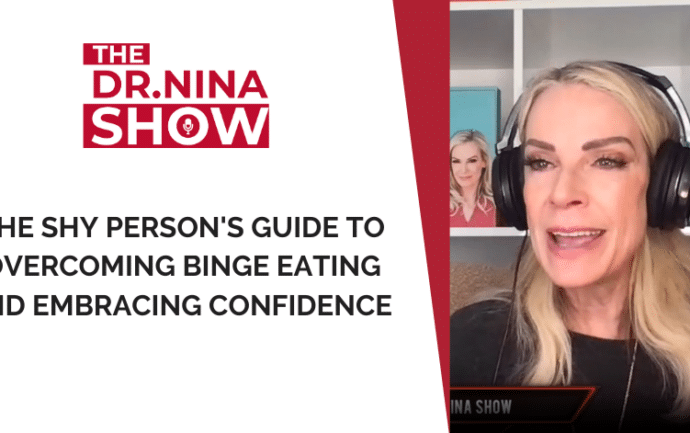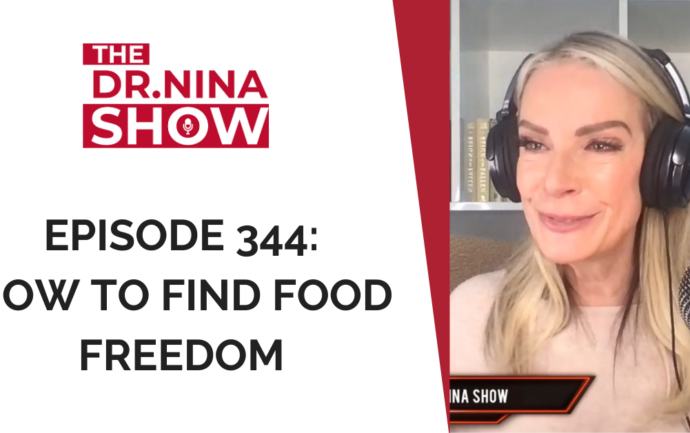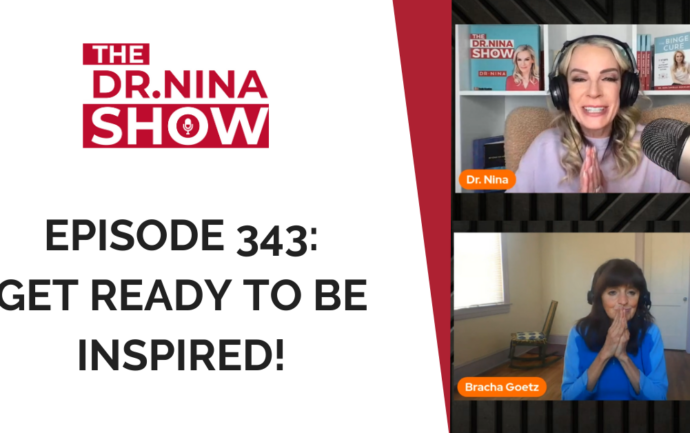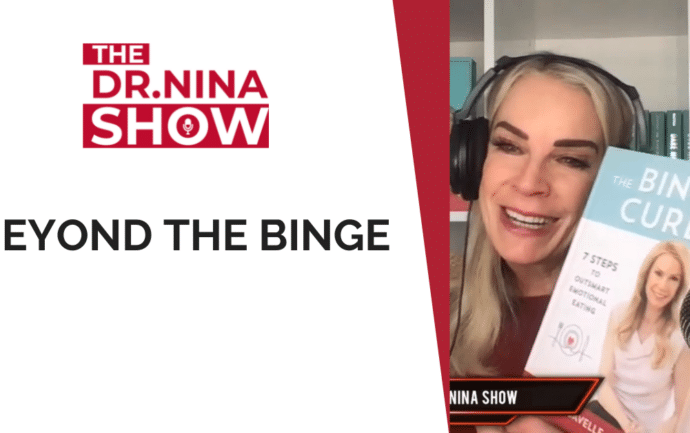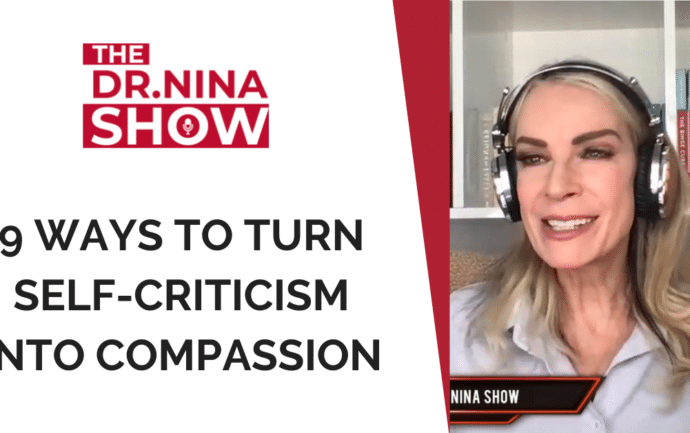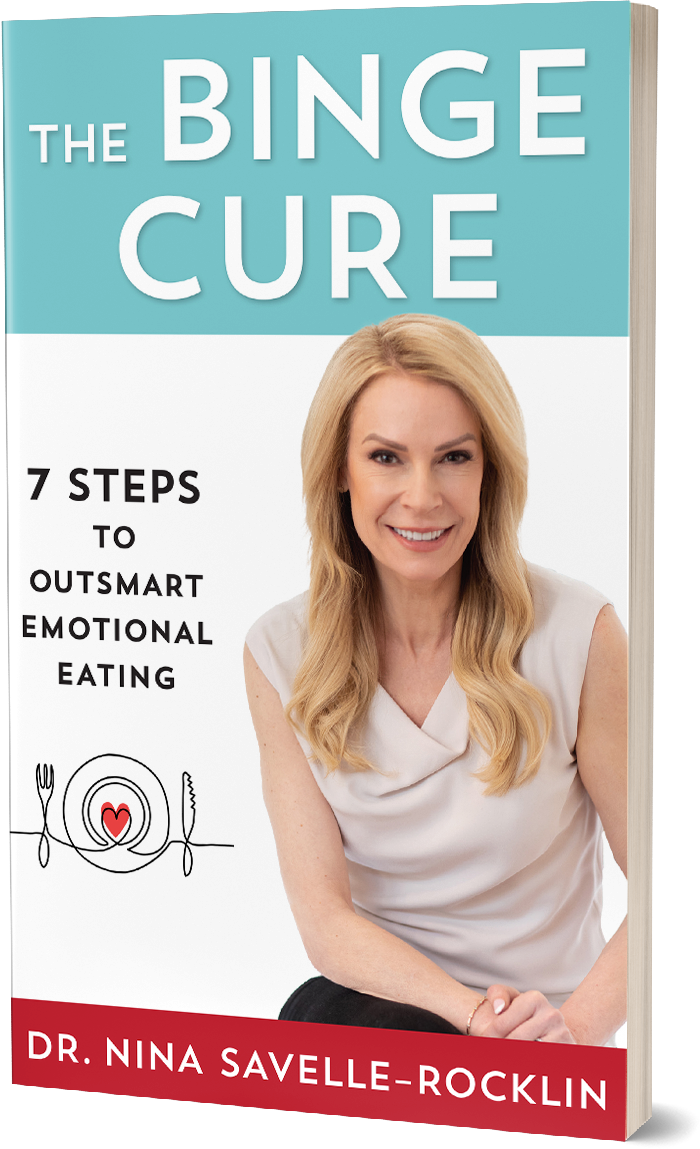Dr. Nina Savelle-Rocklin
Why Do Mothers Use Food As A Reward And How To Deal With It
Transcript
Dr. Nina
Hey there. Welcome to the Dr. Nina Show here on LA Talk Radio. I am your host Dr. Nina Savelle-Rocklin, and I am here to help you stop counting calories, carbs, and fat grams. Stop dieting, so you can easily get to a healthy weight, and get on with your life. That is what it is all about. I want you to wake up and think about your day, not your diet. Not your diet. If you’d like to call in and talk with me, the number here is 323-203-0815. 323-203-0815. I would love to hear what is on your mind, what is weighing on you, because the real problem with binge eating, stress eating, any kind of emotional eating, the real problem is not food. It’s not. Food is the solution to the problem, actually. The real problem is what is eating at you. And so, I am here to help you talk through those root issues, so that everything with food can then change. Again, the number, 323-203-0815.
Okay, I have some questions today. These are from members of my online group, Dr. Nina’s Food For Thought Community. Actually not my group, my community. If you’d like to join, go head over to Facebook and join my Food For Thought Community. It is free and you can ask me questions, and I will answer them. Okay, Nicole says, “Can you speak a little bit about how people use food as reward, and how can you shift that mentality? What are some practical things you can do instead?”
So, no, this is not my personal number, by the way. I should mention that. Someone is asking on Instagram, “Is this my personal number?” It is not. It is the number for the LA Talk Radio station that is routed through the actual studio, where I am not, and into my home, so that if you’ve called that number, you will talk to Ronan, my engineer, and then he will patch you through to me as apparently, he has just patched Karlygash through. I’m going to answer Nicole’s question in a little bit.
Hi, Karlygash.
Karlygash
Good morning, Dr. Nina. How do you hear me?
Dr. Nina
You’re a little muffled.
Karlygash
How about now?
Dr. Nina
That’s a little better.
Karlygash
Okay. And how about now?
Dr. Nina
I feel like I’m in the eye doctor’s office and they keep switching that thing like, “What about now? What about now?” Everything looks and sounds exactly the same as the last one. “What about two? It’s the same as one.”
Karlygash
Yeah, thank you.
Dr. Nina
Okay, so I can hear you. You start talking and I’ll tell you if something goes wrong.
Karlygash
Okay. So my question is about emotions and feelings. Right after that, not about food, although I managed to stop binging yesterday and today. Thank God, with your help and others on a lot of changing as well as analyzing. You know that I was diagnosed with Lyme disease, and I’ve been watching this past two weeks, like how it manifests itself. And so it turned out to be chronic, so most probably, I have it since I was a kid.
Yesterday, I was doing this binge for days, your program, where we on a Zoom meeting, and all of us like so many people, and for the first time I was thinking, “Hey. This is a safe place. Let me show up just the way I am.” Somebody texted me, I mean left a message I had to share. I would be like, it’s work, but she said, “I wish you could share because you seem to be so sad and down and all this.” And I just today texted her back, “You know what? I was not exceptionally sad, but this is how I feel pretty much my whole life, except when I’m doing something interesting, I don’t know when my mind is busy with something new or something.” But Lyme disease is like I always have chronic pain inside my body but I already learned to maybe not notice it so I could actually live, with life and mask it all the time because when I come to society anywhere to work, on a date, to talk to friends, I need to cover the pain and I need to put up emotions.
So I noticed that it’s a coping mechanism [inaudible 00:05:23] when people say, “How do you feel?” I never tell them because you could just bring on my face what ever I’m feeling inside. Pain and consequently, when brain is exposed to pain all the time, sometimes it’s very challenging to keep the mood up and emotions up but you managed to do that. So when people ask you, how I am, I have to give them this version. But yesterday, I was thinking, “Hey, [inaudible 00:05:48] a safe space.” So I’ll just show up the way I am. I showed up and I could see how down I was, my face, and I always feel ashamed of my real emotions because I feel like when I show up like this, I feel like I make people uncomfortable or it brings the whole mood down.
Dr. Nina
Let me address that. That is someone discerns that you are sad or you are struggling, that you make them uncomfortable, then you are disguising your true feelings, your true expression that you’re in pain. Both physical and emotional to protect somebody else, to protect the others so you don’t show up authentically. And then what happens with those feelings? They end up being unbearable and there’s binging to get away from them. Yeah. So my question would be, where did you learn that your feelings are somehow a burden to others or make others uncomfortable?
Karlygash
Thank you very much, Dr. Nina. I was also thinking about it because I know you’re going to ask it. And this is how you taught me and I’m very grateful. So, first of all, I want to say for this person who texted me privately, I am very happy she texted me. It’s just so she doesn’t think I feel uncomfortable. No, I am very happy but you acknowledge, it wore my heart hurts so much. So where I learned that my feelings are burden, well not too far. My mom was schizophrenic and she was a person with special needs and I was a terrified child, I pretty much was an adult. And I was parenting her so when there were times that I had to be strong as a kid, I never had a chance to sit on her lap and be appreciative and be like, “Oh, mommy! I want it, I want this toy! I have this problem!” Never had that. I as a kid was thinking how to get money, how to get food, how to cook, how to manage two schools. Both musical and [inaudible 00:08:12].
And also, I was responsible for her and her emotional state. So I kind of learned to be, so I learned to wake up the dead people. When a person is schizophrenic, it’s pretty much mental disorder. They have something going on in their brains so they cannot be happy by default or something so I developed so many [inaudible 00:08:41] Dr. Nina
Okay, so Karlygash, you learned how to survive with a schizophrenic mother and this family that you’ve spoken about often on the show, which of course did not display a lot of interest in what was going with you. And the strategies that you learned were to take of and entertain and complement and relate to people in a certain way but never do anything in which you showed up too much because you were constantly being told you were too much. And so, this is the strategy that you learned to survive early on but then it’s not like we get older and we suddenly change our strategies. We take the way that we survived in our families, in our childhood. We take that into the world.
Karlygash
That’s really uncomfortable.
Dr. Nina
And when you go into the world, you’re not with people who are kind or interested and warm and considerate. You’re with your original family and that’s why people will experience people not as they are but as other people were. And so, it’s become just a habit. A habitual way of relating to others in the world, but then nobody is there for you and with you. Nobody is there to metaphorically have you on their lap, and take care of you, and hug you, and listen tot you, and no one is there for you. So food becomes the thing that takes care of you, food which represents people become that which takes care of you. So part of the key is, and I’m so glad that you showed up at [inaudible 00:10:41] last night and were authentic and didn’t try to hide it and didn’t put on a performance of, “Hey everybody!” You were you. And that took a lot of courage and look this woman saw and reached out to you because she’s concerned, not because you’re too much, but because she cares. She cares about you.
When you grow up with a schizophrenic mother, you don’t grow up with a true parent. You don’t grow up feeling parented. You have to contend with this person who is not able to be there for you and with you in a normal way. And then food becomes your parent. So learning to trust that other people can be there for you, that other people can care about you, just as you care about others. Learning to receive, you take that in and then when you take in the care of others you don’t need to only rely on food as the thing to take in.
Karlygash
So, thank you so much, Dr. Nina. As usual, it makes so much sense and just eye opening. And also, I have a question. So I have this kind of fear because I never learned to show up the way I am regarding all my history so right now I have kind of this modeled and learned behavior that I don’t show burden people. I even have this when I show up [inaudible 00:12:29] I hide because I always think, “Oh, they just started the program. They need help. I’ve been already for a while with you so I’m stronger.” See I’m doing the same thing. The way I parented my mother, that’s why I parent [inaudible 00:12:45] which many of them are women who are older than me. And it never comes to my mind that they can be even supporter or something but thanks to this experience of yesterday, I got the support. I think that if I do things, new things which are proper things to do and I don’t have to repeat this pattern which I learned in my family. But I have this fear, usually.
I was analyzing what doesn’t let me preform new behavior, although like mental I know because I’ve been learning about it. I figured out that it’s fear and it’s coming from childhood thing. I never could show up the way I am with my emotions because all those complications. But now when I’m an adult and I understand that I am in a new environment and maybe I can try new behavior but the fear is so subconscious. I don’t even catch it. I don’t even see it, only if I sit down and analyze. So, with this fear, if I do just new behavior I will not die, right? So I just need to do stuff.
Dr. Nina
We operate unconsciously. So much of what we do is unconscious. The motivations of why we do it are hidden from us in our unconscious minds. That’s why I like the weed and root metaphor. You can see the weed, you cannot see the root. But the root is creating the weed and the weed is the behavior you don’t want. The behavior you want to get rid of, the attitudes you want to get rid of. So, when you make the unconscious conscious, when you take what’s hidden and bring it into the light, then you can see what you’re dealing with it. You have this assumption that you have to give up yourself to take care of others so that they will really tolerate you. That is an idea from childhood we’re digging out. That’s a root thought. Digging up and recognizing and challenging so that you say, “Wait a minute, I don’t have to show up to take care of other people so that they merely tolerate me. I can actually take care of some people and some people can take care of me.”
And that’s mutuality and that’s reciprocity, rather than this one way you give, they take mode that was buried very much apart of your childhood. All giving is not good and all taking is not good. In the middle is when you give and receive and you can trust that you don’t have to just be the one that takes care of others to be liked, to be loved, to be known, to be accepted.
Karlygash
My thinking never goes to be accepted, I don’t think about that. Listening to you I figured out, that’s true to any room I come, to any whatever society group of people. I always consider myself the strongest or something and I automatically, subconsciously take care of all people except myself. So I think that I’m more knowledgeable and it’s ridiculous. I can’t talk to people who are lenient, cooperation. And I will still be younger taking care of them but then, actually…
Dr. Nina
Wait, if I may interject…because…
Karlygash
I can see it very clearly now, I don’t have to do it anymore.
Dr. Nina
And you do take of people that are older. Your aunts that you’ve talked about on this show are older.
Karlygash
Oh, that’s true.
Dr. Nina
So, when someone is an older person, it resonates in your psyche as an authority, as a parent and that’s how you relate to that person.
Karlygash
Oh, that’s true. That’s true, because when I deal with kids, that’s opposite. I never consider them weak, I consider them strong. See? How interesting. When I played with kids, I saw them strong. But even with kids sometimes I do this. It’s the dopest thing ever. It’s just so cool. Now I see the thing, I will think about it until the next week. I will not do this anymore because I already know. And I’ll do a couple of things when it’s coming but I will recognize and learn from it. Oh my god. Psychoanalysis is really my new entertainment, it’s so cool. Oh, and Lyme disease now.
Dr. Nina
Well, I’m glad that you are challenging some of these thoughts and ideas that you have taken as truths so that you can move from a place of selfless, being selfless to self care. It’s self care, which is you take care of others and yourself. They take care of themselves and you. This is balance and this is ideal and this is a recipe for a great society. So…
Karlygash
That’s cool.
Dr. Nina
Please when you respond to whoever it was from Binge-Free Babes who checked in with you, remember, they’re so because they care. You’re not the only one who cares about others, other people care about you and receive that. Receive that.
Karlygash
Honestly, it’s felt so good, Dr. Nina. Because she was coming from such a strong loving place and I could feel that she is really strong herself. She doesn’t need help like I did to my mom. It just felt so good, I cannot even explain. The way she texted and it’s not her first time she texted me, but I was freaking out when she was texting because I didn’t get used to receive support like this, healthy support. And I was like trembling but now I understand and I see. And honestly it just feels so good. It’s just the main thing.
Dr. Nina
Let that in. Let that in. And let that be a new template for how to be in the world.
Karlygash
I’ll do it, thank you. I’ll get a new template.
Dr. Nina
You don’t have to earn people’s love, you don’t have to earn people’s liking you that you can just so up and who you are is likable and who you are is lovable. You don’t have to earn it by care of others. Okay!
Karlygash
Dr. Nina, sorry for cutting you. Just a second, I got it. So what we do here every time when I call, we make a new cookie template with you. So, I can take a new template, say a Christmas tree template, and make cookies for myself. So, we’re molding them.
Dr. Nina
Whatever symbolism works for you, yes, a new template. A new way of being in the world that soon will become the natural way, the natural way.
Karlygash
Natural. Got it, thank you so much.
Dr. Nina
You are so welcome. Thank you for always calling in and being so vulnerable and open and reflective. That is a beautiful thing indeed.
Karlygash
Thank you so much. I love your ideas and you’re amazing, oh my God.
Dr. Nina
Thank you, Karlygash. I’ll talk to you next week.
Karlygash
Okay, next week. Have a wonderful day, Dr. Nina. Take care.
Dr. Nina
You too. Bye-bye.
Karlygash
Thank you, bye.
Dr. Nina
By the way, if you guys are interested in the Binge Free Babes program, which Karlygash was just talking about, just go to bingefreebabes.com and learn all about it. Okay, Nicole’s question, questions actually. Can you speak about how people use food as reward, how can you shift that mentality and what are practical things you can do instead. Well, we often learn to use…we’re taught to use food as reward actually because early on parents say, “Hey, no dessert unless you eat all your chicken.” Or, “Hey, if you do this, we’ll go out to this special dinner.” In our culture, we actually do use food as reward. Birthday cake celebration, reward celebration, it’s all part of the same kind of constellation. How do stop? And by the way, it’s sometimes parents do it because they are absolutely not thinking about it as in the, “No dessert for you if you don’t eat this.” That’s just setting up dessert as something special and coveted and then you reward yourself later but also, sometimes just out of desperation.
One of my friends was on a…a couple of years ago on a 5 hour trip to Yosemite with her 2 kids who were then, 7 and 10, something like that. And those kids would not stop bickering. And if you’ve ever been in a car with bickering kids, 5 hours is long time. So out of desperation, she went to a gas station, she bought a whole bag of candy and she just bribed them to be quiet for 5 hours with candy. She said, “I know it’s not the right thing to do. I just couldn’t think of anything else.” So this becomes, when these things happen, it’s nobody’s fault. We just want to explain it. It’s used as a reward. So, the answer is to reward yourself differently. And think about how you might acknowledge or reward a friend, if a friend said, “Hey, I got an acknowledgement…I got a raise.” Now you might say, “Hey, let’s go out to dinner to celebrate.” Maybe not these, when no one is going out to dinner, at least not in the LA area but you wouldn’t say, “Oh, have some cookies.”
You’d say, “That’s great! I’m so proud of you, that’s wonderful! You really earned it. This is fantastic.” You would use words. And so, rewarding yourself with words, acknowledging yourself rather than rewarding yourself with food is important. The other thing about is if food is a reward, that means food is a good thing to you. Now, food should be a good thing, it should be enjoyed. It’s made to be delectable and delicious and it ought to be enjoyed. In a perfect world, we enjoy what we eat. We don’t have this battle with it thinking, “I should eat that, I shouldn’t eat that.” And the whole deal. But if you don’t have enough fun in your life, you’re going to use food for fun, food as a reward. Food for fun. So, one thing, Nicole that I would suggest is develop other rewards in your life. What is fun to you?
What can you do that is fun? What could you get to yourself that is…what could you get for yourself that is fun. The more fun that you have in your life, the less likely you will be to use food as a reward and food for fun. So, I’m getting nice messages. Thank you so much for the nice messages on Instagram. You guys are awesome. Appreciate the compliment. If you like to join me, the number is 323-203-0815. 323-203-0815. I saw that Jenny had posted a comment on Instagram saying that she could really relate to what Karlygash was saying. Jenny, give me a call. Let’s talk about. Let me know what’s going on with you.
It’s from Robin. She says, “I want your thoughts on journaling my meals. I feel like when I write down what I’m eating, I’m focusing on food all day but it does help at times because I know when I’m overdoing it and making bad choices.”Well, Robin, I agree with you. Writing down what you’re eating all day does put the emphasis on what you’re eating on food instead of what is eating at you. And also, if you’re relying on writing down and journaling everything that you eat, then you are relying on a piece of paper or a note in your phone or something external telling you if you’re overdoing it rather than relying on within. How full am I? How hungry am I? On a scale from 1-5, where’s my hunger? 1-10, where’s my hunger? What sounds good? Not from an emotional standpoint but do I need protein? Am I in sort of a carb mode? Whatever it is, when you are constantly journaling what you are eating, you are putting the focus on what you are eating instead of why.
So, oh Josh, you’re at Cedar’s. Well, thank you. I will continue to thrive and I hope everything is okay at Cedar’s. You’re in a great place though, doesn’t get any better than Cedar Sinai here in LA. So know when you’re full by what your body tells you, not by what a note tells you. [inaudible 00:27:19] Other than, getting in touch with or getting attuned to your internal queues which is how hungry am I? And by the way, Jenny is on. Ask and you shall receive. Here she is. Hi, Jenny.
Jenny
Hi, Dr. Nina. How are you?
Dr. Nina
I’m doing well. What’s going on?
Jenny
Yeah, I was just listening to your show as usual and Karlygash always, there’s always something very relatable…even though we grew up in completely different countries, in completely different parts of the world, in completely different cultures, I can always relate to something that she says. It’s very interesting. We’re all connected just as human beings, and as women. So, when she was talking about how when she always feels like she’s the strong one and she should take care of everybody, and how her dynamic with her mother, I really can relate to it. It’s very interesting, even though the circumstances are completely different. I’m always the one too, like in my group of friends, someone has an issue and I’m like, “Oh, okay. I’ll fix it.” Then I’m like, “How am I qualified to do this fixing?” I’m just so used to fixing because my mother relied heavily on me to be her partner because my father was an alcoholic and couldn’t help her.
And now that she’s older, I had an issue with her yesterday, which is interesting that Karlygash mentioned this because I had a very long conversation with my mother yesterday trying to explain to her how she’s not the only one. She wants me to help her do everything during the pandemic. She thinks she’s the only one going through it and not being able to leave the house and not being able to go to the store. She thinks that I’m here to be her therapist, and her delivery person. I’m like, “Lady, you’re a grown woman.”
Dr. Nina
Jenny. Jenny, say that again without laughing.
Jenny
Lady, you’re a grown woman. That part?
Dr. Nina
She wants me to be her delivery person and she wants you to be her mother.
Jenny
Oh, yes. That. Yeah. And I think she’s had children, honestly. I don’t even get upset about it anymore. I see as I get older, my mother’s mental illnesses. And I just think she had children. Not that she doesn’t love me, it’s not that I’m saying she doesn’t love me. I just don’t think she really understands that type of love between a mother and child. I think she had children because she needed something. She needed children to be her friend and be her…and I hate to say it…servant, and I think that’s the way she grew up in her culture. My grandparents are from Italy, straight off the boat. Their culture is very family oriented, the women take care of the men. The young people take care of the older people and she had a daughter thinking I would never leave her and I would take care of her for the rest of her life. And of course, what did I do? I left her. I came to California. I abandoned her, and now she feels very alone and that has nothing to do with me.
It has everything to do with her and nothing to do with me. But I do feel like I have to be strong all the time. All the time, be strong and I don’t really have family to lean on when I need to be vulnerable or need help so, that’s hard. That really takes a toll on you.
Dr. Nina
And then if you have put yourself in the position of being the carer of all your friends as well, then nobody is taking care of you.
Jenny
Yes, and it’s interesting because I even went into a job where at first I do makeup for the entertainment industry. And at first it was creative, it was fun, and it was drawing on faces and making people beautiful but really that job, it’s a…I work in the service industry. And so, I’m taking care of my clients when I’m on set. And it’s interesting that I went into a job that I’m also kind of like a caretaker. And I’m like a built in best friend on set and I find all these really interesting. I’m piecing it all together how my childhood has led to my choices or even subconsciously until now and how I’m now pulling away from all of this because I’m so sick of taking care of other people. I don’t want to be mean about it but…
Dr. Nina
It’s not mean, it’s balance.
Jenny
Yeah.
Dr. Nina
It’s balance and sometimes when you’re the kind of person who takes care of other people, and Jenny I want to share with you that Karlygash just posted about…just said how amazing that people are so similar even in different parts of the world with a bunch of hearts for you.
Jenny
Aw, thank you.
Dr. Nina
When you are raised with this, never explicitly stated but implicitly stated, this is your role. Then that’s the role that is familiar to you, then you can find people who are good with that role. Then you can find unbeknownst to yourself, make friends, who are really good at receiving which fits well with your giving. That dynamic then just gets perpetuated so it’s really good that you’re able to see how automatic this has been and now you can start looking for how can you have reciprocity with other people. Who in your life is there to listen to you and be there for you and with you? How can you set limits with some of these people in your life who might’ve gotten very used to you giving, giving, giving, giving, giving, and that’s just how it is and they don’t even think about it, that it could be more reciprocal.
Jenny
Yeah, that’s what I’m working on now. Even with my mother, little by little because I can’t…she just doesn’t have the…I don’t know what the…she doesn’t have…she just can’t think that way. She just doesn’t understand when I talk to her about…I give her medical. She doesn’t understand because of her anxiety, I don’t even think she can focus on the words that come out of my mouth actually. I think she just is in her own world ball of anxiety. Even with her, I’m like, “Mom.” Her phone breaks and she calls me and she’s like [inaudible 00:35:46]. She flips out. “You need to fix this.” And I’m like, “Mom, okay. We teach a man to fish, and we will eat for a lifetime. Let me teach you how to fix your own phone.” And she just doesn’t have the patience for it so little by little I’m trying to get her into doing things for herself. And it’s been a hard pandemic with her.
Dr. Nina
And setting limits and saying, “You know what, mom?” I trust you have the capacity to figure it out yourself. I’ve got to go, but I have confidence in your ability to get this figured out.” And they will figure it out because…
Jenny
She always does, yeah she does. She’ll figure it out.
Dr. Nina
Yeah, yeah.
Jenny
And if she doesn’t, who cares? It’s a game on your cell phone that you’re freaking out about or it’s a Netflix show that she can’t play. These are the things she’s freaking out about. She’s freaking out about these things that because she has nothing to do during the pandemic. She can’t leave the house, she can’t go to walk around the mall like she normally does, so she’s really…she hasn’t taken this whole stay at home situation very well. And sometimes I can understand and then other times, I think she just doesn’t get it. The whole world is angry at the same thing she is. She’s so self involved sometimes that she doesn’t see that it’s not just her. And she gets into this pity party like, “I can’t even go to Walmart and walk around.” Okay, lady, no one can go. None of us can do that. Calm down, it’s Walmart. But to her, that’s…it’s a catastrophe.
Dr. Nina
And allowing yourself to respond in a different way to set boundaries, in a measured way, say, “Yeah, you and everybody else on the planet going through the same thing. Hey, I got to go.” Setting limits and deflecting and changing the subject and not tolerating and not getting sucked into that and eventually she’s going to stop.
Jenny
Yeah, I’m hoping so. I’m hoping so.
Dr. Nina
And you have an opportunity to then figure out, well how do you relate with other people if you’re out of your comfort zone and you’re not taking care of them, which could bring up its own challenges.
Jenny
Yeah. It’s interesting, I’ve been trying to ask some close friends when I need a favor or whatever. Normally, I try not to ask anybody for anything because I feel horrible guilt like I’m putting them out. But lately, I’ve been trying to implement asking for help and it’s interesting. It’s definitely interesting to start getting taken care of a little bit and I quite enjoy it actually.
Dr. Nina
Yes, that’s good. You have a deficit of that. You have some time to make up.
Jenny
My neighbors are like, “Oh, we’re going to the store. Can we pick up anything or you. And normally I’m like, “No.” I feel horrible giving them a list of things, but lately I’m like, “Yeah, you know what? I need some stuff. Can you pick that for me?”
Dr. Nina
Good. That’s good.
Jenny
Thank you.
Dr. Nina
And it’s fine, you’re not asking for too much. You’re not your mother.
Jenny
No.
Dr. Nina
Asking for help is not the same as being kind of a dependent, needy person like your mom. There’s healthy needs, and then there’s neediness and often we can get the two confused especially when we have a very needy parent.
Jenny
Very true, very true. Yeah. And I used to think her neediness was weakness and I think she just…I think she’s actually very strong and capable and so, I do have confidence that she’ll figure out all these issues that she calls me. She just lacks patience and because of her anxiety issues, focus, and she flips her lid. So I think that when I’m not there to help or I can’t help her, she’ll figure it out herself so I’m trying that.
Dr. Nina
Yes, your job is not to help your mother figure things out from across the country. Your job is what every mother’s job actually is, which is to empower their children figure it out themselves. The relationship is flip flopped, you are having to do that for her but when you do that for her, you’re also doing that for yourself. And that’s good.
Jenny
Well, thank you and I hope Karlygash got some good insight from my phone call too because I think she could learn from your words of wisdom as well from that.
Dr. Nina
Well, thank you. I think everyone that’s been in a position of sacrificing or ignoring their own needs and wants so that they can take care of the needs and wants of others, which then leads you empty and that emptiness can be filled symbolically by food. It can be resolved through rose, in your case. It’s takes many forms but ultimately when you resolve the main issue, which is that things are reversed and too one-sided and when you start to have more reciprocity in your life, you need less rose. You don’t need to binge for fulfillment or whatever is going on with food.
Jenny
Yeah, thank you. I appreciate you always taking my phone calls.
Dr. Nina
Of course, Jenny. I appreciate your calls. And sounds like you’re doing a lot of reflecting and that is a very good thing indeed.
Jenny
Thank you, Dr. Nina. I’ll talk to you next week, hopefully.
Dr. Nina
Okay. By for now.
Jenny
Bye-bye.
Dr. Nina
So Waleed has a question, he’s on Instagram. He said, “Is a female necessary for a male to relieve stress or can a man live without a woman?” Well, we all need each other. We need to be interdependent. Some of us need people more than other people do. Some people need people less, but most people cannot only live with themselves and the idea is to create interdependency, so that whether it’s a man with a man, or a man with a woman, or a woman with a woman, or whatever incarnation it may take. We need to be able to take care of our selves and be taken care of by others and take care of others. Interdependency means you have your own life. You don’t wait to be completed by another person. What was that Tom Cruise movie? With Renee Zellweger? I’m totally blanking out. Someone tell me, it’s like one the tip of my tongue, with the whole you complete me. Jerry Maguire. Thank you, Ronan. Jerry Maguire. You complete me. No, nobody completes another person. You’re a complete you. Thank you, Ronan.
You’re a complete you and you also have a relationship with other people in which it should not be one-sided. You complete yourself. You are a complete person. You can take care of yourself and you can take care of other people and those people can take care of you. That is ideal, that’s interdependency. So Waleed, I hope that answers your question. Just in the couple minutes that we have left, I just wanted to say something to Robin regarding journaling. If you, Robin or anyone that can relate to Robin, does not feel ready to stop journaling and stop journaling meals, I would change it up a little bit. Rather than I’m going to write everything that I eat down. I would, yeah write it down, but don’t make that the focus. Write down how hungry was I? What was going on? Is it physical hunger or emotional hunger? What was my purpose in eating this? Was it lunch? And that was that, or was it, “Oh, I’m anxious and I’m going to eat this or that to deal with my anxiety or to calm my body down?
Or did I eat a bunch of chips because I’m upset? Food mood formula, chips lead to anger, frustration, any form of anger. So write down what you’re eating if you must but write down what is eating at you as well. Write down what you ate or what you are going to eat, what are you thinking about. What’s on your mind? If you weren’t eating, what would be on your mind, if it’s emotional hunger? That shifts it to less about food, and more about what is going on within you. I have one more quick question. This is from Sharon.
She says, “How can I apply your principles when I have an eating plan after weight loss surgery that includes counting calories, fat, grams, carbs, and protein?” This is a tough one, Sharon but it’s very similar to questions people have asked me about doing the AIP protocol that I’ve had to do because of my autoimmune disease, which is all about restriction. And what I had to do was change my mindset, instead of “Oh I can’t have that.[inaudible 00:47:15]” Binging or overeating, you want what you can’t have.
In my case, I want what I can’t have but I also know that if I have it, it’s going to be bad for my health. And so, Sharon I would apply a similar principle, that you’re counting these calories, fats, grams, carbs, and protein because you are attending to your health rather than make it about, I can only have this or rather than make it about deprivation or dieting or it’s that type of diet mentality say, “Okay, I know what’s good for my body. I know what’s good for my health and I’m going to stay within my range because of that, I really want to be the healthiest that I can be.” That would be my recommendation. It’s hard knowing that deprivation leads to binging or overeating. It’s hard when focusing on what you’re eating distracts you from what’s eating at you. It puts the focus on the wrong thing but if you have to do it, just tweak the mindset a little bit and focus on, I’m doing this for health and not a diet mentality. I hope that helps, and that is our show for today.
Thank you so much to Karlygash, and Jenny, and Waleed, and Josh, and everyone who joined me both calling and on Instagram. I really appreciate you. I am here every Wednesday at 11an Pacific to answer your calls, to help you deep dive into what is eating at you and weighing on you because when you deal with that, all of those food issues go away and you get true liberation. Bingefreebabes.com. That’s bingefreebabes.com and you can join us. We meet every Monday night. The Facebook community is…pretty much people are all over the world so it’s sort of 24/7 kind of community. It’s just a beautiful thing to see and to be part off and I’m really, I’m really so honored to be a part of it, with Kelly Gunter, my co-host.
So, everyone, stay healthy. Stay safe, and I’ll see you next week. Bye for now.
You’re listening to the Dr. Nina Show, with Dr. Nina Savelle-Rocklin. Only on LA Talk Radio.
The Author
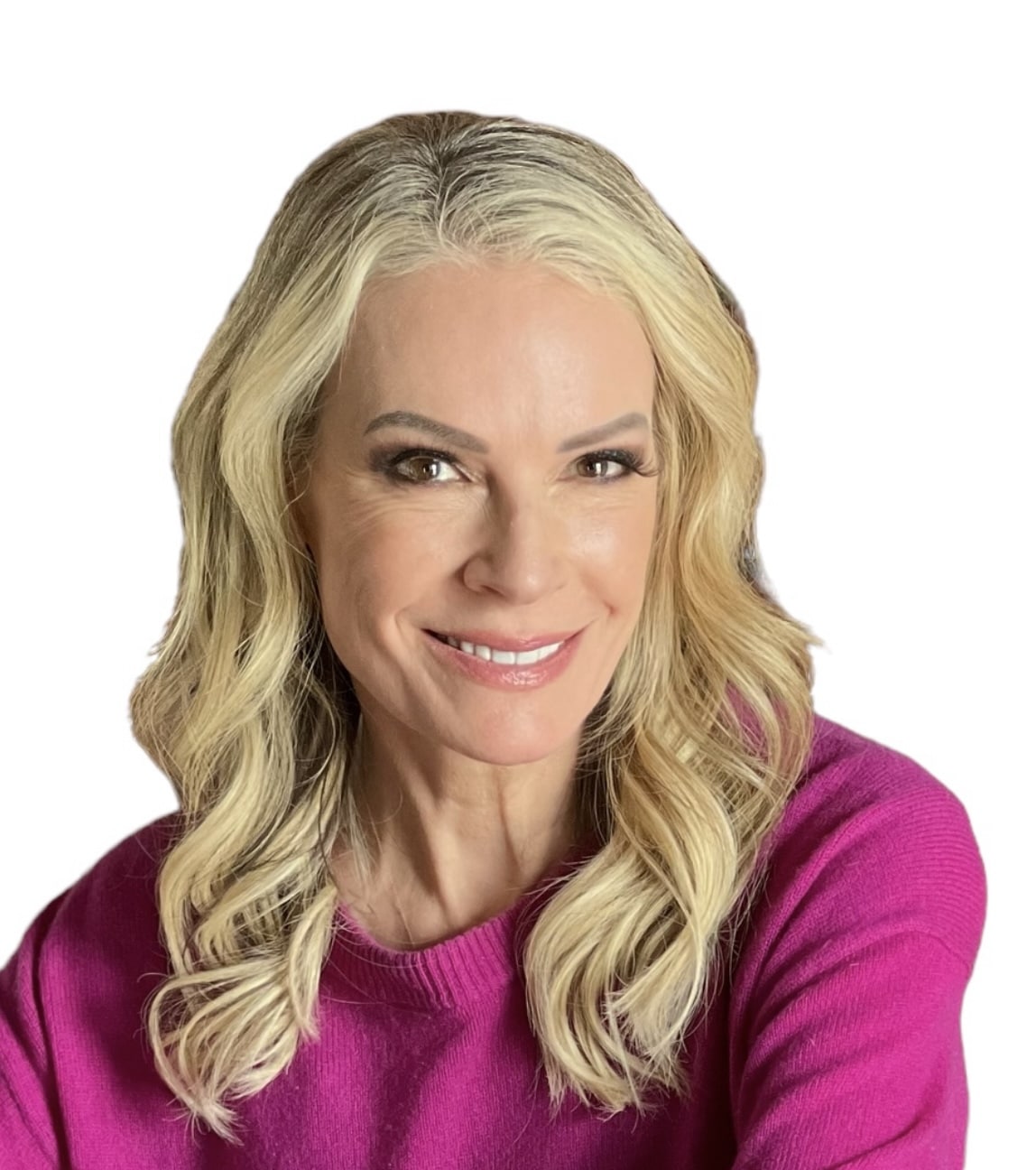
Dr. Nina Savelle-Rocklin is a psychoanalyst, author and radio host specializing in binge eating disorder. She is the author of The Binge Cure: 7 Steps to Outsmart Emotional Eating and Food for Thought: Perspectives on Eating Disorders, and co-editor of Beyond the Primal Addiction. She hosts The Dr. Nina Show radio program on LA Talk Radio.
More episodes

